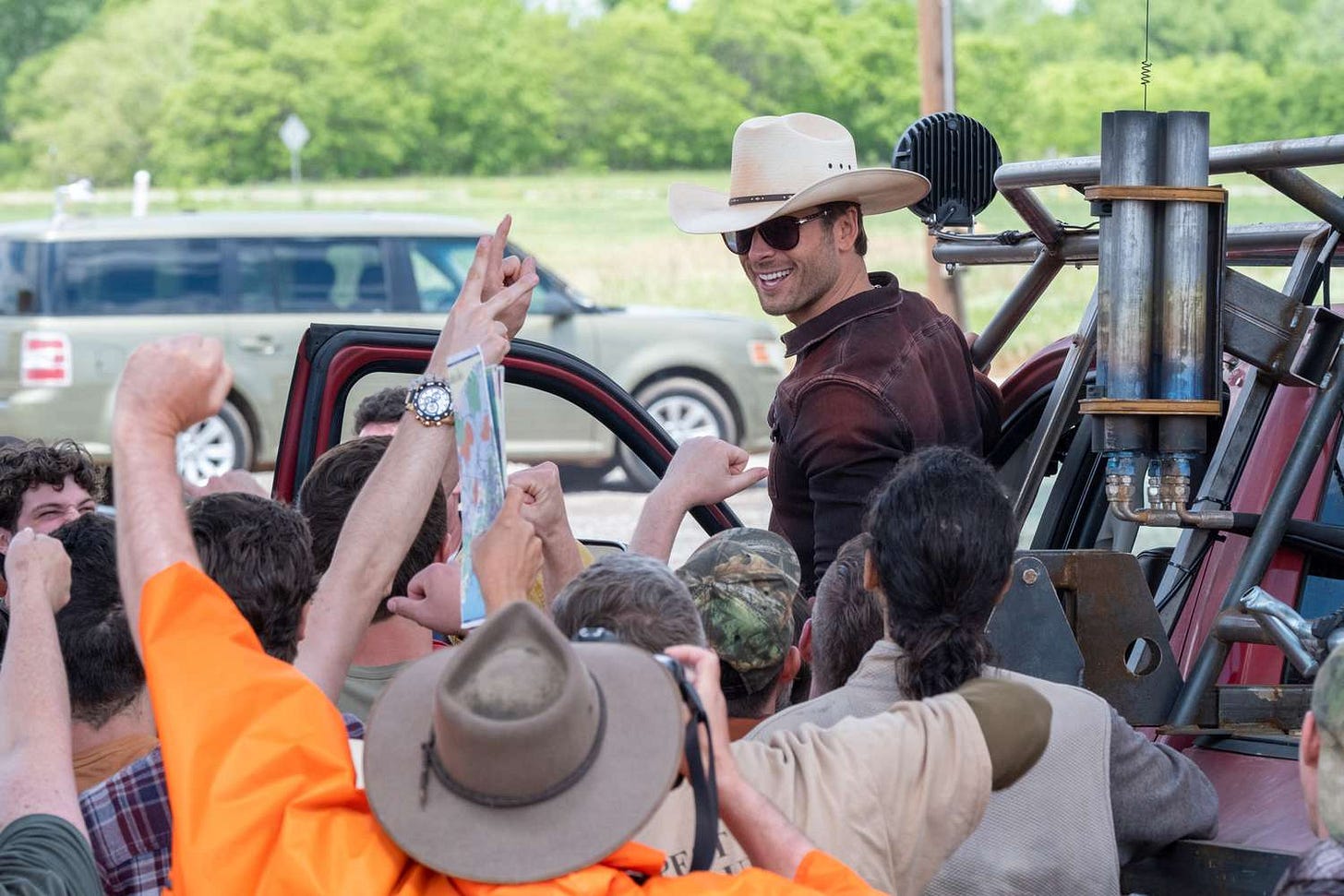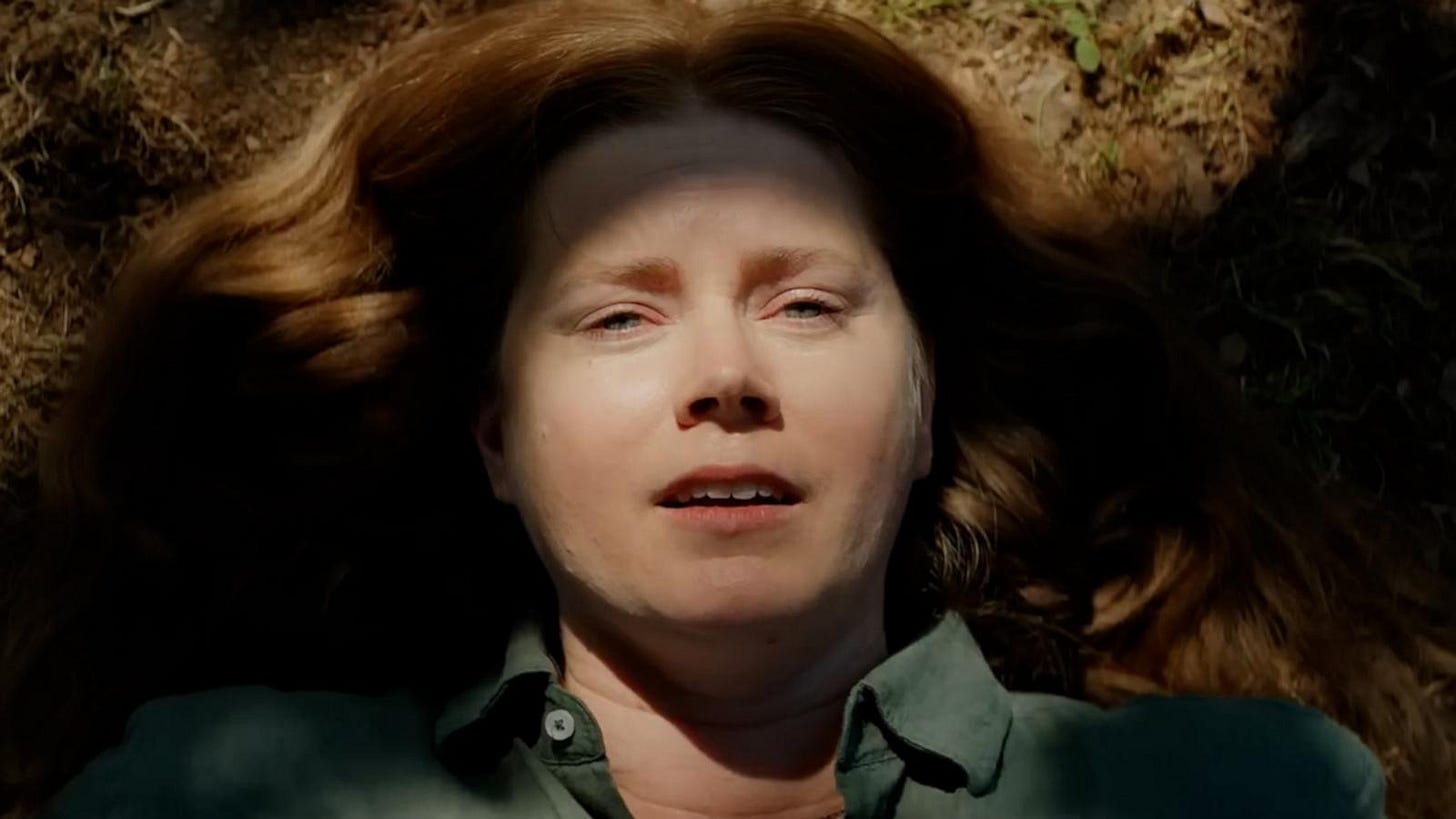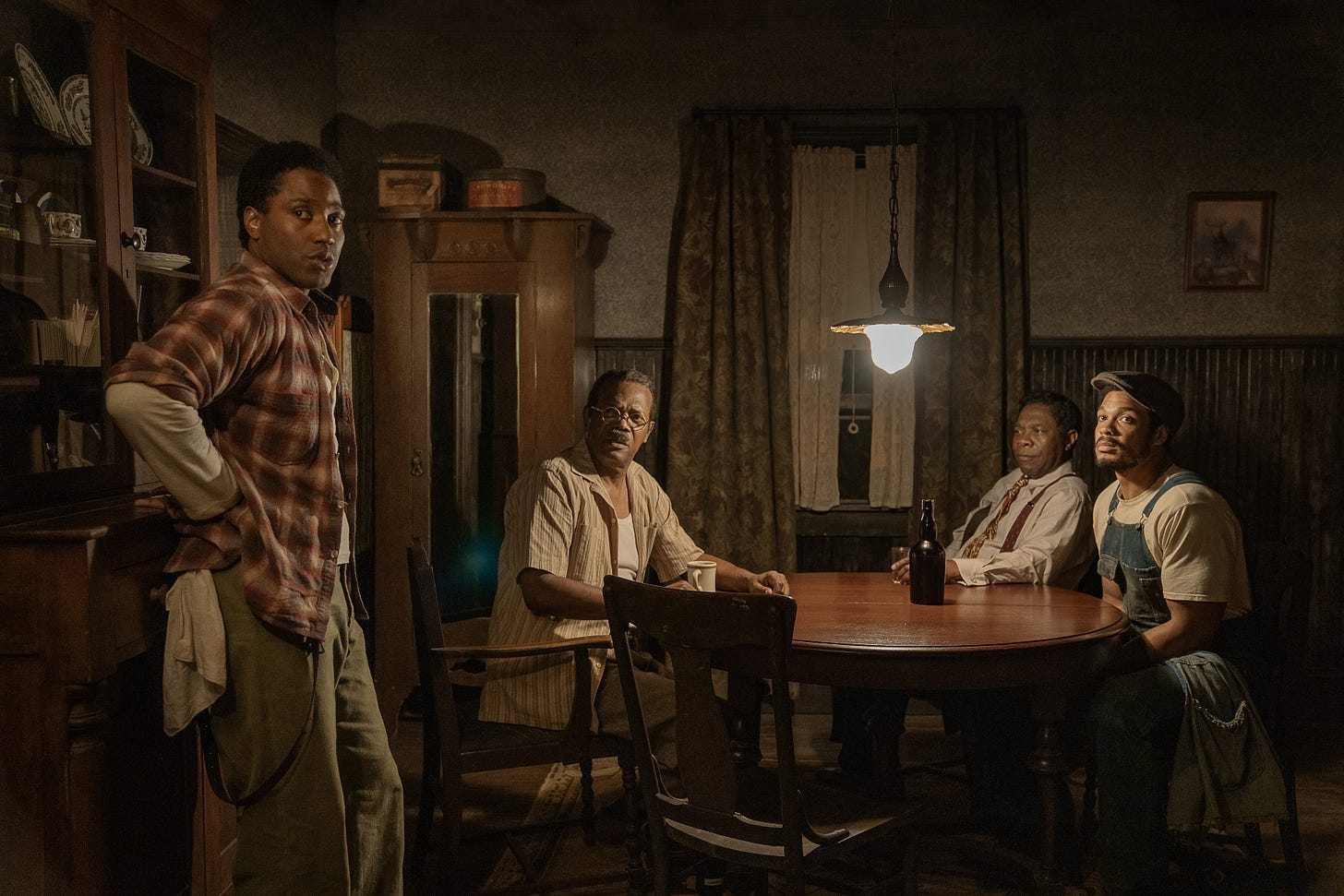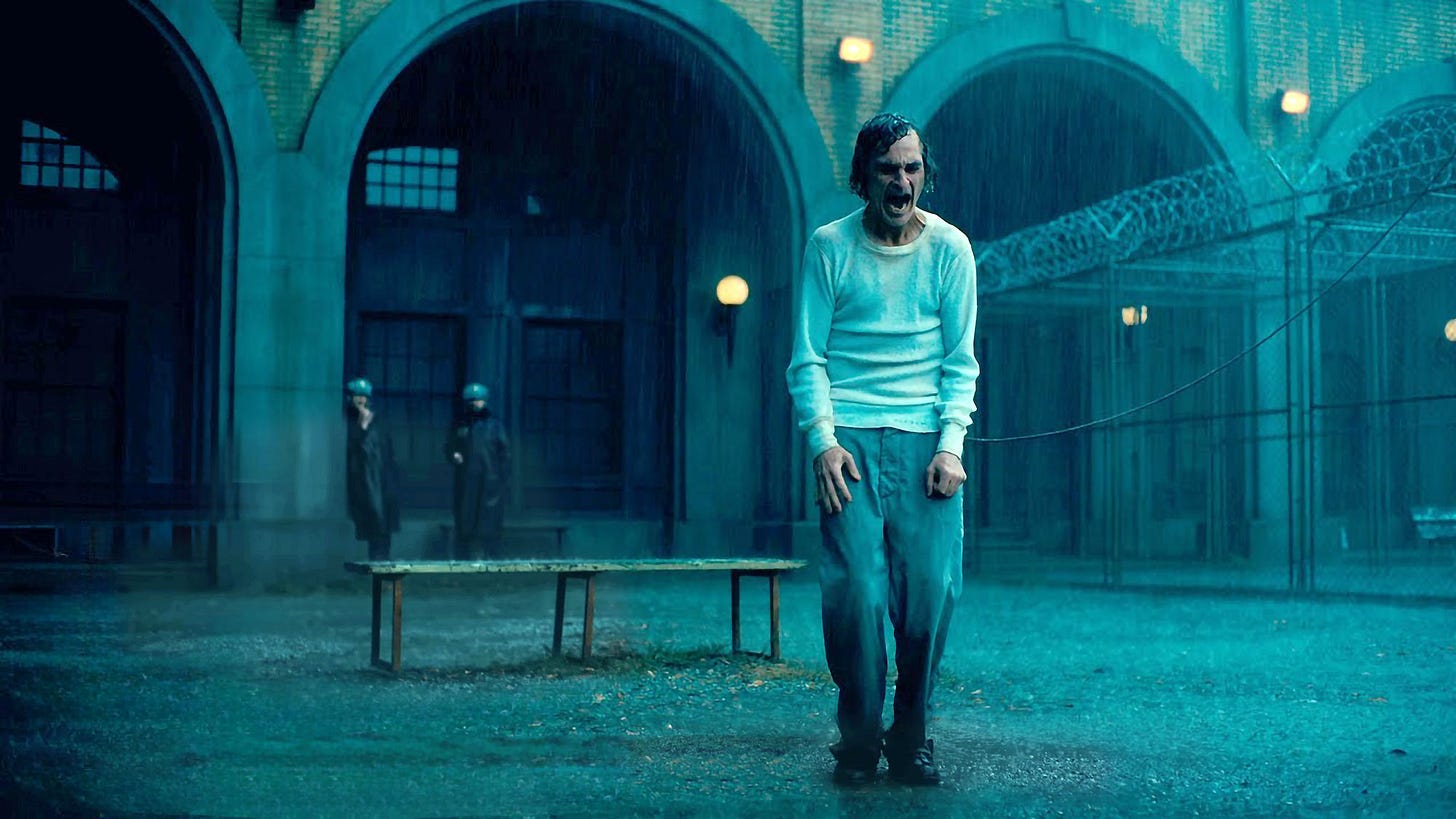O, readers, it’s almost hard to believe that we haven’t checked in since the end of October with each other — almost, that is, until I consider just the sheer volume of new streaming films and television series that we’ve yet to discuss from the end-of-year period. So many are there, that I think both for your sakes and for mine I’m splitting this serving into two, starting with today’s mix of two television series and seven(!) awards-vying films from both familiar and newly introduced international and domestic storytellers. From a ‘body electric’ fantasy to a war-torn drama, these on-topic selections — several of which are hopeful Golden Globe nominees this evening — I hope will help you ease the transition this week from holiday relaxations to workday rigors.
Wishing you all a happy 2025! 🫖
The Substance (2024)
Mubi • Horror • Façade
Synopsis
The chance to recover the sparkle of her youth drives an aging actress and fitness model to adopt an unorthodox treatment that quickly costs more than she anticipated.
My take
For its first hour, Coralie Fargeat’s (2024) The Substance was by far the best film I had seen all year. With a premise and initial follow-through more solid than its fitness models’ formidably sculpted six-pack abs, the film genuinely excited me. It’d been nearly a full year since any film had proposed to take me for such an ambitious, dense, and thought-provoking ride, no less simultaneously had actively demonstrated the potential to actually deliver on that proposal. I sat quite literally on the edge of my seat in the theater in early November and waited ready for more. How would this elevated glamour fable conclude?
Sadly, readers, by the time I left that theater, my exuberance had died way down. Choosing to invest all its creativity into the manifestation of its body horror conceit, The Substance struggles to find a successful resolution to the many profound questions it asks so confidently in its opening sections. Is the make-up still immensely impressive? Yes; yes, it is. But, as the central characters in this film can no doubt tell you by its conclusion, substance cannot depend on good looks alone. Without spoiling the plot too much for you, readers, what I can say here is that it’s not that I wanted The Substance to end in any particular way, but instead that the questions it itself posed the audience — i.e.,
how can any individual reconcile the years it takes to truly succeed in an industry premised on a specifically youthful beauty with the aging passage of time those years necessarily entail?
is it morally permissible to even entertain existing within the rules of such an industry, or is continuing within its confines tantamount to self-abuse and self-destruction?
as aging individuals who recognize the ills of the business and its effects on ourselves, are we at all allowed to look fondly back onto our younger accomplishments with the pride of self-recognition or will those now remote moments forever to us be foreign versions of ourselves we once failed to fully appreciate while we were focussed on accomplishments elsewhere?
what is “my best self”?
in what domains is it ever important to measure how “gracefully” anyone ages?
— required a diligence and depth that the film didn’t ultimately seem prepared to provide. Lost in the superficial details of the plot points it’d contrived, the film fumbles its attempts at generating meaningful and equivalently powerful answers to its own deeper questions. A final ‘red-washing,’ if you’ll allow me to coin the term, only accomplishes as much as any thick coat of paint on its own mends any unfinished structure: Sure, the final product stands out, but does anyone actually want to live there?
And it’s really quite a shame, because the faltering of the film’s foundation over time undermines the early excellence of many of its key contributors. Demi Moore would have confidently been in contention to win the end-of-year ‘Actress in a Leading Role’ awards, had the trajectory of the film not tended toward shock so blindly; and Benjamin Kračun’s ardently confrontational cinematography too could have handily competed with any other moving imagery this year, had the purview of his subjects not effectively been taken away from him by the exigencies of the story.1
Ultimately, because I am consciously deciding to be more glad for the shining moments this film did have than sad about the shining resolutions it could have had and because even just asking its central questions in its own particular fashion does add to our culture beyond the ways similarly themed films and other media already have added in the past (e.g.,
Death Becomes Her [Zemeckis (dir.), Donovan, & Koepp (wri.), 1992],
Strange Case of Dr. Jekyll and Mr. Hyde [Stevenson, 1886],
Hocus Pocus [Ortega (dir.), Garris, & Cuthbert (wri.), 1993],
Brazil [Gilliam (dir./wri.), Stoppard, & McKeown (wri.), 1985],
All about Eve [Mankiewicz, 1950],
The Comeback [Kudrow & King (creators), 2005 & 2014],
Being Julia [Szabó (dir.) & Harwood (wri.), 2004],
The First Wives Club [Wilson (dir.) & Harling (wri.), 1996],
Snow White and the Seven Dwarfs [Hand et al., 1937],
The Picture of Dorian Gray [Wilde, 1890],
Boogie Nights [Anderson (dir.), 1997]
), I am going to recommend this film to you, readers, with the crucial and fair warning that anyone inclined to squeal around deliberately unshy bodily ‘features’ may find it difficult to not look away from this ‘as labelled’ modern-Gothic horrorshow of a pretty fable.
Temperature check
Hot (but sweatily so)
Twisters (2024)
Peacock • Action • A lot of hot air
Synopsis
A studious meteorologist foils but flirts with a swaggering storm chaser apparently in hunt of fame before the abatement of destructive American tornados.
My take
More than merely irresponsible in its philosophy, Chung (dir.), Smith, and Kosinski’s (wri.) Twisters, this year’s “at long last” sequel to the now action classic Twister (de Bont [dir.], Crichton, & Martin [wri.], 1996), is in my view actually ideologically dangerous for the viewing public. Despite ostensibly espousing advances in science — specifically meteorology — since the original 1996 film’s advancements, this new film actually stands firmly on the anti-scientific notion that a single transformational figure can sense-make (1) truth from fiction and (2) signal from noise well beyond the capacity of any of even the latest and most informed technology or algorithmic instrumentation. So, rather than confront occasions on which human expertise can eclipse algorithmic performance in judgment and prediction as examples of informational gaps in our best scientific modeling (or, at least, reporting), Twisters effectively claims that some truths are essentially unknowable (or at least unrecognizable) by anything other than a keen human sensibility.
Thus prioritizing an anti-intellectual or anti-academic skepticism before the comforting familiarity of a divine or otherwise superhuman sense imbued in certain select and literally adorable individuals, this film rides hard for the section of the viewing public that withholds credit from the rigorous and methodical work of earnest practicing scientists and instead preserves that credit for magnetic rogues who are (1) perceived as transcendental experts and (2) therefore dignified as ennobling leaders of rustic virtues and the “old ways.” Sure, science and technology can and will help even those rogue experts and leaders observe and control the mysterious ways of the natural world, but only inasmuch as any crystal ball or deck of cards can and will help a “gifted” reader divine and divert the future where anyone else would see only refracted light or whimsical illustrations. In other words, readers, according to this film, talent and expertise aren’t obtainable by anyone willing to dedicate actual time and energy to experience and study; talent and expertise are exclusively instinctual, unteachable, and innate. Knowledge and study are therefore only for ridicule or dismissal, with particular mysteries about the natural world left entirely to “explanation” by religious creation.
Action junkies, consider yourselves duly warned: Quaff this fundamentally toxic revenge on science, education, and technology for its effects-driven high notes if you absolutely must, but don’t swallow — at least not without the necessary antidote of awareness regarding the philosophical and political undertones you’re intaking.
Temperature check
Frigid
Nightbitch (2024)
Hulu / Disney+ • Drama • Woof
Synopsis
A stay-at-home mother finds disturbing solace in escapistic fantasies of primal freedom while navigating the sacrifices she’s made to be a parent.
My take
Amy Adams’ latest project, a seemingly faithful adaptation of Rachel Yoder’s (2021) fantastical and feministic novel of the same name, was interesting enough viewing for me to not feel as if I’d totally wasted the watch time on a “made for TV” special on the hardships but joys of modern parenting; but it came close. Descending culturally from previous works like:
The Nanny Diaries (Springer Berman & Pulcini, 2007),
Mrs. Doubtfire (Columbus [dir.], Mayem Singer, & Dixon [wri.], 1993), and
at least one memorable segment from Father of the Bride: Part II (Shyer [dir./wri.] & Meyers [wri.], 1995),
the film follows a primary care-giver’s reluctant inhabiting of a new identity in order to personally survive the stress and tribulations of that weighty individual responsibility.
Now, for most similar care-givers, I’d wager, I almost needn’t say anything more; Nighbitch’s implicit promise of a quasi-taboo frankness regarding the distress a modern parent can feel but must sublimate behind the guise of constant enraptured fulfillment, I’m sure, is enough already for any such prospective viewer to press ‘play.’2 But, for the rest of the movie-going public, what is there to capture the imagination (and make up ticket sales) in this film’s poignant if parental narrative? Clearly, Nightbitch’s singular and defining narrative feature is its fantastical storytelling device of animal transformation, but as a movie-going public we’ve seen this device previously many times in the likes of:
The Fly (Cronenberg [dir./wri.] & Pogue [wri.], 1986),
any werewolf film,
the Animorphs series (Applegate & Grant, 1996-2001), and
even at least in essence this year’s own The Substance (Fargeat; see my take above).
Does Nightbitch have anything to add in its particular deployment of this device in the realm of parenthood?
In my view, while Nightbitch does indeed make good use of the material consequences of its particular, albeit familiar, type of transformation in generating some sincere comic and emotional wins throughout its otherwise rather straightforward story about parents in conflict over their own deïndividuated identities post partum (think Kramer vs. Kramer; Benton, 1979), the best reason to see this film is not any of that showy near-gimmickry but, instead, Adams’ intricate leading performance. Raw and contemplative where other actresses would have been vain and merely fatigued, Adams adds here to her already fairly sterling résumé of mothering performances: from her excitedly pregnant early take in Junebug (Morrison [dir.] & MacLachlan [wri.], 2005) to her dilapidated and misbegotten recent role in what has now become our Vice President elect’s early-career hagiography, Hillbilly Elegy (Howard [dir.] & Taylor [wri.], 2020). Hers is a refreshingly authentic take in an otherwise panderingly uplifting storyline — which, in a year of mostly flimsy or otherwise insufficient leading performances, is an achievement that has and likely will continue to bring her and by extension the film recognition from leading awarding bodies.
So, should you, reader, join Nightbitch’s run toward individual celebration? Even if you’re not a taxed new parent looking for communal consolation, I think, at least for a jaunt this time, sure, why not?
Temperature check
Tepid (just barely)
Dune: Prophecy (Series Premiere)
Max • Sci-Fi • Puppeteering
Synopsis
A stern intergalactic abbess arranges her acolytes on all sides in the contest over interplanetary dominance and a spice trade crucial to their ways of life.
My take
However pleasant it may be to see Oscar and Emmy nominee Emily Watson take a leading role in this high-budget new series and however patterned that series may be on the profound commercial and critical success of not only Dune (Villeneuve [dir./wri.], Spaihts, & Roth [wri.], 2021) but also Game of Thrones (Benioff & Weiss [creators], 2011-2019), the cast and type of Dune: Prophecy alone can’t improve its lackluster writing and editing, stringing together a rather drowsy narrative about long-term power struggles among interrelated ruling families in a mythical dystopian future (idly but, I’m sure, not unintentionally modelled after the Exploration Age’s real search for a sustainable commerce of spices from what would become colonial outposts to their ruling countries’ private distribution channels). Sure, there are moments of sex, murder, betrayal, and scheming enough to check the boxes for an aspiring replacement to the monocultural phenomenon that was Game of Thrones, and piggybacking this series off the recent popularity of Villeneuve’s two ‘event’ films in the same universe also seems like a smart bet on paper; but for anyone who’s actually seen that series and those films — i.e., for anyone in the producers’ and developers’ clearly intended core audience — the whole thing just feels rather dull — dull, because we know that it’s very possible to do quite a lot better. No exchange among the characters in Dune: Prophecy can hold a candle to the creative and schematic dialogues we once enjoyed on a weekly basis among the characters in Game of Thrones; in place of those cutting and carefully calculated dialogues finessing advantage and pain over one’s interlocutors with the deftness of a lifelong diplomat well accustomed to balancing and trading futures on both real and perceived reservoirs of power, the modus loquendi in Prophecy appears to be to convey all intentions, even the shadowiest ones, as bald statements of exactly what one wants at all times — no mystery, no guile, no shrewdness; just vacant transparency, as if the entire series were set in deposition. Furthermore, given this expressive transparency, following all the long and chronologically linear exchanges among the characters in Dune: Prophecy feels less like the revelatory unfolding of the plot’s many necessary and profound premises than like a perfunctory plodding through its singularly minded characters’ quickly deterministic maneuvers toward one ‘all powerful’ end state. In fact, only when those characters hold cards that we in the audience did not realize they held does the series offer any real intrigue via narrative; but who can praise a series for its secrets alone?
Beyond those few actually revelatory moments, the only other interest the series held for me was in its realization of the consequences of the in-world ritual of invoking one’s genetic history. This foregrounding of what is elsewhere backdrop world-building expands on the already familiar realities of the Dune universe by installing a literal additional plane of existence into the psychological and emotional landscape for the characters to consider and inhabit. Yes, this rather fugal plane into which an acolyte must go to contend with her genetic foremothers smacks tonally if not visually of many other phantasmagorical liminal spaces already in our culture (e.g.,
Fidder on the Roof’s dream space [Jewison (dir.) & Stein (wri.), 1971],
The Little Mermaid’s proto-graveyard of unfortunate souls [Musker & Clements, 1989],
American Horror Stories’ “Backrooms” [Gelb (dir.), Baitz, & Baken (wri.), 2024),
but at least its existence and intentional mystery are engaging enough for me to actually want to know more about its nature, laws, and originating process. Sorry, Emily Watson, I can’t really say the same about any of the rest of this your new series.
Temperature check
Cold
The Piano Lesson (2024)
Netflix • Drama • Ghosts in the Machine
Synopsis
An heirloom upright piano resurrects historic ghosts for a diasporic Black American family convening in Pittsburgh, PA, in 1936.
My take
As with Fences (Washington [dir.] & Wilson [wri.], 2016) and with Ma Rainey’s Black Bottom (Wolfe [dir.] & Santiago-Hudson [wri.], 2020), the two other extant adaptations of plays from August Wilson’s Century Cycle Denzel Washington has personally championed onto film, with The Piano Lesson I wasn’t familiar before seeing this cinematic adaptation; but even from this first viewing, by its delicately carved and authentic words I could easily tell, of all three plays, The Piano Lesson has the strongest foundation for film. Winner of the 1987 Pulitzer Prize for Drama, the play centralizes an exploration of the uniquely Black American struggle over ownership, independence, identity, and self-determination in the predominantly white American system — a struggle it does its audiences the justice of rendering as rich and palpable today as it must have really been nearly 90 years ago, when its action is set. Importantly less instructive or didactic in its rendering than connective and human, the deliberate focus of the play remains on the essential humanity of its characters and their interpersonal dynamics throughout, rather than on ever removing those identities and dynamics to another time and place. As a result, the feeling of the play is decidedly vital and familiar; even though we the audience haven’t necessarily lived or even met people who have lived the exact ways we see on screen, we ‘know’ those people: Emotional investment in their choices and outcomes is easy, cathartic and rewarding. But that’s just the source material.
What this particular adaptation adds in adapting such high-quality source material to the screen are (1) excellent performances and (2) symphonic reveries. Taking the opportunity to produce more than just a transliteration of Wilson’s original work from stage to screen, director and co-writer Malcom Washington deliberately uses the unique affordances of the camera over the proscenium to develop the story into more than just a concert recital. Dreams and memories flood the lens with spectral grandeur as much as spectral monstrosity, showing rather than telling the audience through dialogue how the central characters feel, think, and believe while they’re working to achieve their own particular versions of advancement and happiness. And, among generally solid performances of those characters, Samuel L. Jackson’s and Danielle Deadwyler’s in particular stand out for not just competently executing but more so palpably inhabiting their roles on screen.
This film is not a masterwork, however. Sadly, this The Piano Lesson fumbles in juggling the ultimate materiality of its conclusions confluently with the spiritual conflict that its titular piano inspires. Rather than linger in the intriguing ambiguity around the historical haunting of the instrument as an heirloom stained with tears, blood, and injustice, the film chooses to — spoiler alert — literalize that haunting by overtly manifesting the demons of the past in a fervid exorcism as real to the protagonist family as the watermelons one of its key members means to sell. Not only does this choice dissolve the protective ambiguity that Wilson’s original work purposefully built around the psychological well-being of every conflicted member of the family — in other words, the struggles his characters experience can no longer be merely external projections of the internal strife they carry, as soon as those struggles become genuinely external malevolences the characters must and do literally vanquish — but also does the choice thereby induce an unearned sense of total resolution around that internal and interpersonal conflict when the literal ghosts are vanquished, as if to say that the path there forward for the characters both as specific people and as generalizable exemplars of the Black American experience would then be undeterrably clear (even though any modern history book with even a dint of fidelity could easily show countless examples to the contrary). Though, it’s true, the film’s epilogue does grapple with the legacy that the choices of the past must inevitably impress onto the days of the future, such a spare final treatment doesn’t adequately restore or resolve the strength in acknowledgement or commentary the earlier parts of the narrative possessed so abundantly in representing the dire exigencies of the specific cultural inheritance the play explores. In reflection, it makes a person wonder whether the conspicuous nepotism Denzel chose in hiring his two sons Malcom and John David to respectively direct and star in this film ultimately cost the project the opportunity of a storyteller whose own separated perspective on the piece could have better met Wilson’s own dream of a greater resolution for his original narrative’s complicated threads….
Still, even with a fumbled conclusion, The Piano Lesson is likely to be one of the best films of this year — a relatively fallow year by my standards, mind you, but still one of the best in it.
Temperature check
Hot (just barely)
Joker: Folie à Deux (2024)
Max • Musical • The Jester’s Lament
Synopsis
Repercussions from his crimes contrast regret against rebellion as paths forward for Gotham’s misunderstood comic at large, the Joker.
My take
It’s not that Joker: Folie à Deux was fundamentally a bad idea, nor is it that its execution completely misses the mark; from my perspective, it’s actually that the film came so close to being the spectacle it really wanted to be, but despite literal explosions never really lit the dynamite we all actually wanted it to see.
At its heart, Joker: Folie à Deux was always a romantic musical, born of the elegant and passionate musical traditions of the 1930s, 1940s, and early 1950s, when on-screen couples including especially Fred Astaire and Ginger Rogers graced their ways through tangled connections and spotlit choreography to united and compassionate ends. Of course, being a direct sequel to Joker (Phillips [dir./wri.] & Silver [wri.], 2019), the profoundly dark adaptation of the eponymous DC supervillain’s backstory that used song-and-dance performance as a deliberate foil to the overarching mood of tragedy, loss, and disconnection its characters experienced, Folie à Deux as a finished product could hardly ever exist in as universally cheery a state as any of those romantic musicals it clearly used as its inspirations. No, much like its own direct predecessor, Folie à Deux would naturally have to use such inspirations as foils again, to counterweight and redefine the overarching mood of tragedy, loss, and disconnection its characters would experience. I mean, such direction would be fully in keeping with established cinematic themes, facilitating audience interest in and digestion of the new film’s story and outcomes, and at the same time would make for a minimally interesting perversion of the original inspiring musicals’ standard storylines. Huzzah, huzzah, the film’s outline makes sense and, succinctly, feels Joker-y. The problem is, despite the many smart decisions that went into the anatomy of the film (i.e., the make-up, the set design, the casting), when the shoes hit the stairwells and the cameras actually started rolling, all the action proved just a middling trudge through a not starkly distinct battleground. Wan, almost mournful waltzes failed to punctuate or contrast against a bleak unforgiving social and legal drama, to the extent that even diegetic commentary asks whether the show might be on the wrong track.
Now, I do recognize that, especially because of the diegetic commentary, this ultimate feeling of disappointment in Folie à Deux may indeed have been purposeful for Todd Phillips, his co-writer Scott Silver, and the rest of their cast and crew. Joker (2019) was deliberately contrarian, giving comic book fans splashy musical numbers instead of relentless action sequences and grievous monologues— and, perhaps despite themselves, the same comic book fans loved it. Why then should the same audiences not respect or even embrace Folie à Deux’s being further contrarian, replacing the panache of Joker with baleful overtures, lamenting rather than extolling the film’s and its primary characters’ own antisocialities?
Well, for one, as David Fear of Rolling Stone (October 2024) rightly pointed out, those who flocked to and celebrated Joker for its aggressive anarchical and anti-social attitudes are hardly likely to take kindly toward withering admonishments against those same tendencies in round 2, however more socially and ethically responsible those admonishments may be at large than regurgitated “antisocial idol worship.” And then who else is there really in the theater to applaud this meta-meta-commentary on the dangers of first-order contrarian groupthink? The rest of us who enjoyed Joker’s cheeky take on its source material *not* as a declaration of an aspirational new world order but as a dramatic discourse on liminal criminality are still back at wondering why we’re being distinctly and deliberately let down here.
Then also — and more accessibly than tracking or not tracking the intellectual backbends that the filmmakers intended — it’s just slow. Folie à Deux stalls and sputters when it should glide. Even for the pre-converted, who didn’t wrinkle in confusion at the soigné subtitle, who know what a waltz can be, or who actually wanted an extinction of the flames Joker fanned into existence, it’s slow. Trim the excess; limit the moral waffling; control the steps taken. Then maybe we could have the same contrarians’ contrarian message land more impactfully at under 100 minutes than ooze out over nearly 140 — or, at least, we’d all be able to go home sooner.
O, readers, is Joker: Folie à Deux “bad”? No. No, it’s not. But is it worth your time? Also, no — and not because as the movie-going public we should demand more high-budget antisocial features blasting with anarchical and even homicidal supervillains and their fanatical explosions of our social constructs, tangible or intangible, but rather because the lesson that the film provides to the exact contrary is in the roughest and dreariest possible form it could take, so nearly opaque to the viewer that I’m sure most of the audiences that actually attended the screenings missed or at least misinterpreted its position.
Temperature check
Cold
Blitz (2024)
Apple TV+ • Drama • Mum’s the Word
Synopsis
Forced to separate under threat of the air raids on London during World War II, a mother and her son struggle to reconnect amidst the increasing rubble of the world around them.
My take
I’m honestly not quite sure what Steve McQueen, director and writer of not just this new film but also director of the Rich Pick and Oscar winning 12 Years a Slave (McQueen [dir.] & Ridley [wri.], 2013), was thinking when he set about to tell this story. I don’t blame Saoirse Ronan (or the rest of the cast) for wanting to work with him, to see through this film’s initial vision in faith that it’d ultimately be as powerful as the best of his past work; but I do lament their involvement in what ultimately would become a confusing melodrama of a feature-length film.
Why “confusing,” you ask? Well, it’s certainly not because anyone in the audience could ever be confused about what the film is trying to say or do. Its naïvely simple moralities about race, charity, community, and aggression, moralities which even children could freely skim off the surface like buoys off a mill pond, leave no more ambiguity about their substance than the lemmata of “after school specials.” Frankly, the confusion is entirely about how any adult filmmaker wouldn’t be too embarrassed about this instructive naïveté, to allow the film as is onto our screens.
Consequently more like children’s access to the “greatest hits” of British tragedies during World War II than like any adult-minded WWII fare I know, Blitz even goes so far as to even have its biracial Black child protagonist explicitly comment (essentially), “Actually, it is OK to be Black,” after witnessing a Black soldier nobly intervene between xenophobes and their foreign targets. As an adult audience member, I was almost offended by how startlingly faint and shallow a rebuke of culturally inherited racism that exchange turned out to be: morally, sure, but more so narratively. To me, it felt like the dialogical equivalent of punctuating any feminist’s on-screen success with, “Wow, I guess a woman can be as good as a man,” or any LGTBQ+ advocate’s achievement with, “Huh! Maybe queer people are just people.” The paradigmatic example of telling instead of showing, the exchange is just one clear example of the laughably over-exposed historical and social agenda the film clearly has.
Now, are the messages belonging to those agenda inherently laughable or not worthwhile? No, for goodness’ sake, of course they’re not; but their inherent worth isn’t the issue here. The issue is instead the messages’ maximal transparency, trading any dint of subtlety or artfulness the film might otherwise have had for a clear moralistic education so direct that for the sake of the reputation of the filmmaker(s) I can’t imagine the intended audience not being exclusively very young children. That the film’s lessons also add nothing new beyond what the countless other books, films, documentaries, and series have already made clear about the history or the extracted morality of the wartime period especially in England (see BedKnobs and Broomsticks [Stevenson (dir.), Walsh, & DaGradi (wri.), 1971] and Mrs. Henderson Presents [Frears (dir.) & Sherman (wri.), 2005] for quick, closely relevant examples) and that one of the two protagonists happens to be a child are all the more reasons to “credit” that interpretation. Unless you’ve been in a coma since the late 1940s, no adult should really learn anything new from this film or find any interest in it beyond perhaps its costumes, sets, and make-up. Not even Mr. Zimmer’s score, a bewildering jumble of influences and notes, entertains.
So, steer clear, readers, unless you happen to have small children in need of guidance on the ills of prejudice and the collateral costs of martial tactics for civilians during World War II.
Temperature check
Cold (nearly freezing)
Somebody Somewhere (Season 3)
Max • Comedy • Fulfillment has costs?
Synopsis
Choices to couple or decouple call identity into question for a talented but nearly tetherless Midwesterner and her small family of friends.
My take
It may have taken two complete seasons, but the ‘little engine that could’ series Somebody Somewhere has finally, in the premiere episodes of its third (and final) season, struck gold. Delicate, nuanced writing provides an extremely solid foundation for the season’s (and the series’) core questions about finding direction in life during adulthood. Moments are sensitively drawn, exuding everyday elegance in storytelling about personal uncertainty, want of connection, and hesitation about its costs; and I believe it has always been the unique strength and ultimate goal of the series, to render such moments with the removed but compassionate lens of a familiar observer, recognizant enough to chuckle at the on-screen foibles but kind enough to feel empathy in having that recognition. This season is the first time I’ve really seen the series succeed in going for that goal (see my takes on the first season here and the second season here). I applaud its growth and sincerely commend its deliberately going out on a high note.
Temperature check
Hot
Emilia Pérez (2024)
Netflix • Musical • Vidas Dobles
Synopsis
A Mexican crime boss entangles an altruistic lawyer into an extensive plan to reformat her life.
My take
A gripping central performance from Spanish telenovela star Karla Sofía Gascón redeems this otherwise mediocre new musical from French director (and one-time Rich Pick nominee) Jacques Audiard3. Despite sharing the Best Actress award at Cannes earlier this year with her co-stars in the film, Zoë Saldaña and Selena Gómez, only Gascón truly impresses. (Saldaña suffices, and Gómez gives no more than she regularly gives come each new season of Only Murders in the Building [Martin & Hoffman (creators), 2021-present; see my take on the most recent season here]). Gascón’s gravitas, deploying cunning and compassion with an unsettling unpredictability across her role’s demanding arch, makes this film’s otherwise rather rambunctious and melodramatic narrative earnest and anchored. That the actress may uniquely have also been able to bring her lived experience to bear on the performance is just a bonus, benefitting her audience with the fire of authenticity on the journey.
Otherwise, musically and cinematographically, Emilia Pérez is kind of a mess. Stunted, unmotivated ensemble performances, meant to whip the audience into the characters’ passions, feel more like disordered flash mobs to which the audience is needlessly and confoundingly subjected; and the mournful, introspective ballads, meant to stir the audience’s empathy for the characters’ plights, feel more like isolating asides, separating rather than uniting the audience and the characters in emotional space. And, when on top of everything else the music itself isn’t very compelling, relying partially on stunted staccato Lin-Manuel-Miranda-derivative beats for mottled emphasis and fully on lyrics that, like Miranda’s worst work, simply dictate a history rather than explicate a situation, then there is little to cling to in admiration anywhere. Perhaps then it will merely be because of the film’s unexpected conceptual audacity alone, that it already has begun to and likely will continue to feature in many nomination lists this season in film…
Whatever its external fortunes, here for our conversation, readers, Emilia Pérez is really for only those interested in its themes (i.e., music, dancing, trans identities, ambition, Latin America, and criminal justice) and no one else.
Temperature check
Cold
Concluding with what most generously can be described as an “homage to Carrie (de Palma [dir]. & Cohen [wri.], 1976)” doesn’t leave a cinematographer much latitude to find his own authorial perspective.
I mean, if not, then I’m seriously curious about how this adaptation obtained any studio backing at all.
Audiard was nominated for Foreign Film in 2009 for his Un Prophète.












